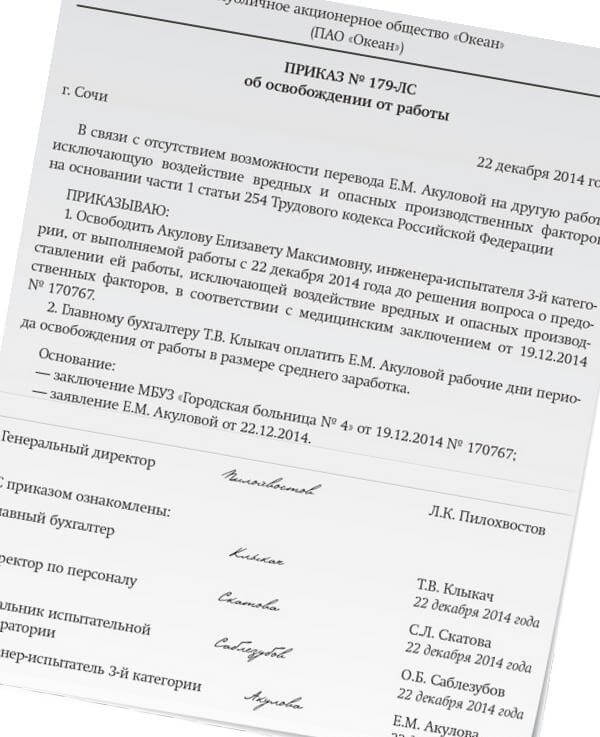The Labor Code protects the rights of various categories of citizens. There are certain conditions for pregnant women. The Labor Code regulates light work for pregnant women especially carefully.
Shortened working hours and long breaks are only part of the benefits and privileges that the employer is obliged to provide.
The law recognizes, first of all, to protect pregnant women from dangerous and difficult working conditions. By the way, an employer does not have the right to fire a woman if she brings a certificate from a gynecologist confirming her position. Let's talk more about the concept of “light labor.”
Law
According to Art. 254 of the Labor Code of the Russian Federation, under certain conditions, pregnant women are transferred to light labor. It implies a reduction in production rates, a transition from places with difficult or dangerous conditions, etc.
Let us note a number of articles of the Labor Code that regulate the rights of pregnant women and gives them a number of privileges:
- Article 64. A woman “in position” cannot be refused a job. However, the condition is met that she can perform the official tasks assigned to her. The employer provides the answer in writing.
- Article 70. There is no probationary period for a pregnant applicant.
- Article 93. A woman has the right to work shorter working hours. A parent who is raising a disabled child under 18 years of age alone has a similar right to standardize the working day.
- Article 122. Before going on maternity leave, an employee has the right to apply for leave due to her by law.
- Article 259. According to it, a pregnant woman should not work: at night (from 22-00 to 6-00), overtime, on weekends and holidays, and also go on business trips on official assignments (Article 198 of the Labor Code of the Russian Federation).
The legislation does not provide for a reduction in working hours while maintaining full pay . An employee who carries a child under her heart will receive money exclusively for hours worked.
However, when transferring a pregnant woman to light work, the employer is obliged to pay her the average salary based on her previous position.
Application for different areas of work: trade, medicine, education, banks, Ministry of Internal Affairs
There are professions that are not only difficult for pregnant girls, but also very dangerous for the health of mother and baby.
The following activities can be included in this category:
- medical field - it is especially important to apply for a transition to light duty for pregnant nurses who work in conditions with the use of hazardous chemicals, in laboratories or use antiseptic solutions;
- trade - every employee of any trading enterprise who is preparing to become a mother in the near future can exercise her right. For pregnant sellers of household chemicals or any other types of toxic products, this is especially true;
- the educational sphere is associated with psychological stress, so teachers are advised to take the opportunity to somewhat soften the conditions of teaching activity or temporarily take another position;
- financial institutions - for pregnant women, the bank also has a sample application that can and should be used, because office equipment does not have the best effect on the well-being of the expectant mother and the development of the fetus in the womb;
- police - for pregnant employees of the Ministry of Internal Affairs, moving to a new, calmer and safer position is very important, since work in the police is associated with physical and psycho-emotional exhaustion.
You can save time and effort on drawing up an application if you download a ready-made sample document and follow its writing scheme.
Areas of activity
In some cases, a pregnant woman may not only fail to cope with her responsibilities, but also find herself in an extremely dangerous situation for her health.
What does easy work mean? First, avoid heavy lifting.
The situation is relevant for many professions, especially in factory settings. This could be the light or food industry. Secondly, work associated with strong emotional stress. The simplest example is a contact center agent who must handle many calls per day.
It is worth understanding that clients of a particular organization are often rude, demand to understand the situation, and express themselves incorrectly. All this negatively affects the unborn child and the mental state of the expectant mother.
Thirdly, work on a production line. Relevant for most factories. For example, on the production line of an enterprise that produces blanks for solar panels, only women work. They check them for quality and wash them. The activity is monotonous, which negatively affects the emotional state. Or an example with cutting off cheese heads in food production.
Fourth , working with harmful or toxic substances. Any chemical production, including laboratory experiments at a large number of factories.
Fifthly, work with radiation or in an enterprise where a private pressure drop is provided. For example, a flight attendant on board an airplane.
ATTENTION! If the working conditions class is 3.1 or higher, then we can talk about transferring the pregnant woman to another place.
In the field of trade or medicine, when there is frequent contact with household chemicals and various kinds of antiseptics. A woman is entitled to a transfer. You should obtain a certificate from a doctor, which will clearly describe the factors that negatively affect your health.
In the education sector, a pregnant woman can expect a reduction in working hours . This could be half or a quarter of the bet. Of course, you won’t have to count on retaining full payment.
Office and banking work involves spending a long time at a computer or near equipment. It is difficult to determine the degree of danger in this case. This will require an assessment by a special commission.
As a rule, the doctor issues a certificate, which reduces the woman’s time, for example, at the computer to 3 hours. Moreover, the rest of the time the pregnant woman carries out some other official orders.
The influence of computer and phone on pregnancy
Scientists are inclined to believe that the use of gadgets during pregnancy causes certain harm to both the pregnant woman and the fetus. But enough time has not yet passed to conduct comprehensive research on the impact of electronics and household appliances on intrauterine development, so the technical harm of using “smart” electrical equipment has not yet been confirmed by anyone. But unverified harm does not mean “absent harm.” Therefore, during pregnancy it is worth reconsidering your view on the use of gadgets.
A stationary computer mainly contributes to rapid fatigue. Poor sitting behind him causes back problems, sitting for a long time causes disruption of blood microcirculation in the pelvic organs, glare on the screen and constant glances at the monitor reduces vision and tires the eyes. But in this way the computer affects everyone who uses it, not just pregnant women. Another thing is that the expectant mother reacts more sharply to all harmful influences. Her back and spine are already subject to increased stress, and sitting for a long time in one position can only develop them. This also applies to other problems associated with working at a computer for a long time. That's why they sometimes say that a computer and pregnancy are not the best combination.
A mobile phone is a source of constant radiation. However, its influence is still debated. Although one study shows that cell phone use during pregnancy increases the risk of behavioral problems in the unborn child (and the child's own phone use at an early age increases this risk), scientists cannot explain the reason for this phenomenon. However, no matter how a pregnant woman feels about such studies, you should at least not hold the phone on your stomach.
Tablets and laptops are one of the most popular gadgets as they are very convenient to use. In addition, the opportunity to watch videos or communicate on social networks at any time and anywhere is often too exciting for expectant mothers, especially on maternity leave. Instead of walking and doing gymnastics, a woman may spend too much time lying down, which will have a bad effect on her weight, blood circulation, and general health. Therefore, it is advisable to control the time spent with a laptop and tablet, and in no case place them on the stomach, even in the early stages of pregnancy.
Of course, it is almost impossible to completely abandon gadgets in the modern world. The work of many women is impossible without a computer. There are advantages to gadgets and useful applications for pregnant women. But if a woman thinks about the harm that a computer or tablet can cause to her baby, then it is better to reduce the use of electronics to a minimum.
Rights of pregnant women
They refer not only to light work, but also to normal rhythm. All rights are regulated by the Labor Code (Articles 251-264). Let's look at the main ones.
- How many hours should a pregnant woman work? You can shorten your working day by 1-2 hours. More privileges in your work schedule. For example, an employee may arrive an hour later. Or, if she is uncomfortable working in the evening, then leave earlier. The best option is to choose a schedule for yourself. As a rule, employers come to the meeting in a variety of ways.
- Keep the employee's job. The employer is obliged to reserve a position for a pregnant woman for the entire period of maternity leave and the period of child care. The employee can return to work immediately after giving birth. Often another worker is hired to take her place. A pregnant woman can change place only at her own request and for medical reasons.
- Work under a temporary contract. It often happens that an employment contract ends during maternity leave. An employer does not have the right to fire an employee who is pregnant or has given birth. She has the right to extend the contract.
- A pregnant woman cannot be fired. This applies to any period. Until the moment you return from maternity leave. An employee can resign only of her own free will or in the event of liquidation or bankruptcy of the enterprise. It is also impossible to reduce a pregnant woman according to Art. 81. Labor Code of the Russian Federation for absenteeism, tardiness, etc.
- Vacation at any time and long breaks. A pregnant woman has the right to ask for a 2-week vacation, even if it is not according to schedule. In addition, the employee is entitled to additional breaks or increased lunch time.
- Exemption from work on the day of inspection . A visit to a doctor is confirmed by a certificate. An employee has the right to leave the workplace at any time if the pregnancy occurs with complications. In this case, regardless of the hours worked, the employee receives the full salary for the shift.
But all care must be officially documented . A pregnant woman is obliged to promptly, except in emergency cases, provide certificates from the attending physician.
If an enterprise goes bankrupt or goes through liquidation, then it is impossible to return to its original place. The employer cannot provide a new position. However, if a branch closes, the employee can expect to be transferred to the head office and/or a subsidiary.
ATTENTION! As for the deadlines, there is no clear definition in the legislation of the Russian Federation. Each case is individual. Transfer to easier conditions can occur at the beginning of pregnancy or at any other time. This is done solely for medical reasons.
How many hours should a pregnant woman work? There are no clear standards and everything depends on the employee’s condition. As mentioned above, a reduction in work shift can be for no more than 2 hours.
Helpful information
Article 64.
- It is prohibited to refuse to conclude an employment contract to women for reasons related to pregnancy or the presence of children;
- At the request of a person who is refused to conclude an employment contract, the employer is obliged to provide the reason for the refusal in writing. Refusal to conclude an employment contract can be appealed in court.
Here's what the Criminal Code says about this: Article 145. Unreasonable refusal to hire or unjustified dismissal of a woman on the grounds of her pregnancy, as well as unjustified refusal to hire or unjustified dismissal from work of a woman who has children under three years of age, for these reasons - shall be punished by a fine in the amount of two hundred to five hundred times the minimum monthly wage, or in the amount of the wages or other income of the convicted person for a period of two to five months, or by compulsory labor for a period of one hundred twenty to one hundred eighty hours.
Article 70 There is no employment test for pregnant women.
Article 93.
- The employer is obliged to establish a part-time or part-time work week at the request of a pregnant woman or one of the parents (guardian, trustee) with a child under the age of fourteen (a disabled child under the age of eighteen);
- In this case, remuneration is made in proportion to the time worked or depending on the volume of work performed;
- Part-time work does not entail for employees any restrictions on the duration of annual basic paid leave, calculation of length of service and other labor rights.
Article 96.
- Pregnant women are not allowed to work at night (night time is the time from 22:00 to 6:00);
- Women with children under three years of age, workers with disabled children, mothers and fathers raising children under five years of age without a spouse, as well as guardians of children of this age may be involved in night work only with their written consent and provided that such work is not prohibited for health reasons in accordance with a medical report;
- In this case, these employees must be informed in writing of their right to refuse to work at night.
Article 99.
- Pregnant women are not allowed to work overtime;
- Involving women with children under three years of age in overtime work is permitted with their written consent and provided that such work is not prohibited for them for health reasons in accordance with a medical report;
- At the same time, they must be informed in writing of their right to refuse overtime work.
Annual paid holidays
Article 122.
- Paid leave must be provided to the employee annually. The right to use vacation for the first year of work arises for the employee after six months of his continuous work in this organization. By agreement of the parties, paid leave may be granted to the employee before the expiration of six months;
- Before the expiration of six months of continuous work, paid leave at the request of the employee must be provided to: women - before maternity leave or immediately after it; employees who have adopted a child (children) under the age of three months.
Article 123.
- At the request of the husband, he is granted annual leave while his wife is on maternity leave, regardless of the time of his continuous work in this organization;
- Before the expiration of six months of continuous work, paid leave at the request of the employee must be provided to: women - before maternity leave or immediately after it; employees who have adopted a child (children) under the age of three months. At the request of the husband, he is granted annual leave while his wife is on maternity leave, regardless of the time of his continuous work in this organization Article 125.
- Pregnant women are not allowed to be recalled from vacation.
Article 126. Replacing vacation with monetary compensation for pregnant women is not allowed.
Article 128. An employee, upon his written application, in cases of the birth of a child or marriage registration, may be granted leave of up to five calendar days without pay.
Transfer to another job
Article 254.
- Pregnant women, in accordance with a medical report and at their request, have production standards reduced at the enterprise, or they are transferred to easier work that eliminates exposure to harmful factors. At the same time, she retains the average salary for the position in which she previously worked;
- Until the issue of providing a pregnant woman with another job that excludes the impact of unfavorable production factors is decided, she is subject to release from work with the preservation of average earnings for all working days missed as a result at the expense of the employer;
- When undergoing mandatory medical examinations in medical institutions, pregnant women retain the average earnings at their place of work;
- Women with children under the age of one and a half years, if it is impossible to perform the previous job, are transferred at their request to another job, while maintaining the average earnings for the previous job until the child reaches the age of one and a half years.
Article 255. Maternity leave
- Women, upon their application and in accordance with a medical report, are granted maternity leave of 70 (in case of multiple pregnancy - 84) calendar days before childbirth and 70 (in case of complicated childbirth - 86, for the birth of two or more children - 110) calendar days days after childbirth with payment of state social insurance benefits in the amount established by law;
- Maternity leave is calculated cumulatively and is provided to a woman completely regardless of the number of days actually used by her before giving birth.
Article 256. Parental leave
- Upon application of a woman, she is granted maternity leave until the child reaches the age of three years. The procedure and timing of payment of state social insurance benefits during the period of the specified leave are determined by federal law;
- Child care leave can be used in full or in parts by the child’s father, grandmother, grandfather, other relative or guardian actually caring for the child;
- At the request of the woman or the persons specified in part two of this article, while on maternity leave, they can work part-time or at home while maintaining the right to receive state social insurance benefits;
- During the period of parental leave, the employee retains his place of work (position);
- Parental leave is counted towards the total and continuous work experience, as well as into the work experience in the specialty (except for cases of granting a pension on preferential terms).
Article 257. Leave for employees who have adopted a child
- Employees who have adopted a child are granted leave for the period from the date of adoption until the expiration of 70 calendar days from the date of birth of the adopted child, and in case of simultaneous adoption of two or more children - 110 calendar days from the date of their birth;
- At the request of employees who have adopted a child (children), they are granted leave to care for the child until he (they) reach the age of three years;
- In the case of adoption of a child (children) by both spouses, these leaves are granted to one of the spouses at their discretion;
- Women who have adopted a child, at their request, instead of the leave specified in part one of this article, are granted maternity leave for the period from the date of adoption of the child until the expiration of 70 calendar days, and in case of simultaneous adoption of two or more children - 110 calendar days from their birthday;
- The procedure for granting these leaves, ensuring the preservation of the secrecy of adoption, is established by the Government of the Russian Federation.
Article 258. Breaks for feeding a child
- Working women with children under the age of one and a half years are provided, in addition to breaks for rest and food, with additional breaks for feeding the child (children) at least every three hours of continuous work, lasting at least 30 minutes each;
- If a working woman has two or more children under the age of one and a half years, the duration of the feeding break is set at least one hour;
- At the request of the woman, breaks for feeding the child (children) are added to the break for rest and nutrition or, in aggregate form, are transferred both to the beginning and to the end of the working day (work shift) with a corresponding reduction;
- Breaks for feeding a child (children) are included in working hours and are subject to payment in the amount of average earnings.
Article 259.
- Pregnant women are prohibited from being sent on business trips, being involved in overtime work, night work, weekends and non-working holidays;
- Sending on business trips, engaging in overtime work, night work, weekends and non-working holidays of women with children under three years of age is allowed only with their written consent and provided that this is not prohibited by medical recommendations;
- At the same time, women with children under three years of age must be informed in writing of their right to refuse to be sent on a business trip, to be involved in overtime work, to work at night, on weekends and non-working holidays.
Article 260. Before maternity leave or immediately after it, or at the end of parental leave, a woman, at her request, is granted annual paid leave, regardless of her length of service in the organization.
Article 261.
- Termination of an employment contract at the initiative of the employer with pregnant women is not allowed, except in cases of liquidation of the organization;
- If a fixed-term employment contract expires during a woman’s pregnancy, the employer is obliged, at her request, to extend the term of the employment contract until she becomes entitled to maternity leave.
- Termination of an employment contract with women who have children under three years of age, single mothers raising a child under fourteen years of age (a disabled child under eighteen years of age), other persons raising these children without a mother, at the initiative of the employer is not allowed (with the exception of dismissal under paragraph 1, subparagraph (a) of paragraph 3, paragraphs 5 - 8, 10 and 11 of Article 81 of this Labor Code).
It is impossible to fire a pregnant woman . She can commit theft at her place of work or ignore work altogether, even if the employee does not appear at the workplace at all; it is impossible to fire her during pregnancy. The maximum that an employer can do in such a situation is not to pay for days of absenteeism.
Be careful : there is one trick that employers often use - when hiring a new employee, they sign not an employment contract, but a civil law one, for example, a contract agreement, a contract for the provision of services or an author's agreement. Unlike an employment contract, they do not give rise to employment relations and are aimed only at achieving the final result. The presence of a civil contract does not give the employee the right to claim guarantees and compensation provided for by the Labor Code. Employees working on the basis of a civil contract receive the same pension protection as employees who have entered into an employment contract, but they are not subject to social insurance and security. Consequently, having concluded such an agreement, the expectant mother falls into the category of persons not subject to social insurance, and therefore has no right to receive maternity benefits. Moreover, in accordance with the Civil Code of the Russian Federation, no features have been established that protect mother and child.
Article 264. Guarantees and benefits for persons raising children without a mother Guarantees and benefits provided to women in connection with motherhood (limitation of night work and overtime work, involvement in work on weekends and non-working holidays, sending on business trips, provision of additional leaves , the establishment of preferential labor regimes and other guarantees and benefits established by laws and other regulatory legal acts) apply to fathers raising children without a mother, as well as to guardians (trustees) of minors.
Article 298. Restrictions on work on a rotational basis. Pregnant women and women with children under three years of age cannot be involved in work performed on a rotational basis.
How to apply for a transfer to light work
The first thing you need is to collect a package of documents. It can be served at any time depending on the doctor's indications. What documents will be required?
- Doctor's report from the antenatal clinic. The document indicates the reason for the transfer and factors that negatively affect the health of the expectant mother.
- Application for transfer to light work.
There is no specific document form. Among the mandatory points, we note: position and full name of the manager, information about the applicant (similar). In the body of the letter - the reason for the transfer (for example, according to medical report No....) with reference to an article of legislation (for example, 254 of the Labor Code of the Russian Federation, in order to save a place and salary).
Next is the date and signature. Of course, we attach a medical report.
Sample
An example application for transfer to light work can be viewed and downloaded below:
The employer reviews the documents.
Next, he offers the employee a list of jobs that she can count on. An organization cannot pay a pregnant woman less than in her previous position. For example, if the salary was 15 thousand rubles, and in the new position it was 12 thousand rubles, then the difference is compensated by a bonus, which cannot be deprived by law.
After familiarization, the employee signs the document. An additional agreement is drawn up, which specifies the conditions of the new workplace, rights and obligations. A mandatory item is the validity period. For example, at the end of maternity leave. The agreement is drawn up in two copies. One is attached to the employment contract, the second remains with the employee.
The manager draws up an order indicating: new position, date of entry, reason for transfer, salary (without bonus). No entry is made in the work book, because After the vacation, the pregnant woman will return to her previous duties.
In some cases, the employer creates a new position specifically for a struggling employee. If this is impossible or not required, then the woman is released from work duties with payment of the average salary.
Labor Code of the Russian Federation: pregnancy, light work
Labor legislation does not contain a definition of the term “light labor”. However, it obliges all employers, if the employee has a certificate with a medical report, to reduce the production rate specifically for her or arrange a transfer to the appropriate position in order to eliminate the influence of harmful production factors. Light work means professional activity in which the worker spends less physical effort and is not exposed to harmful environmental influences.
The following categories of work are strictly prohibited for pregnant women:
- lifting various objects from the floor or above shoulder level,
- lifting weights,
- conveyor production,
- nervous-emotional tension,
- interaction with pathogens of various infections, diseases, harmful substances, IR and UV radiation, radiation, vibration,
- work under conditions of pressure changes.
The basis for transfer to a more gentle mode of operation is a medical report from the attending physician. Without it, the employer has no right to change working conditions.

When does the period end
As a rule, new conditions end when a woman goes on sick leave due to pregnancy. According to Art. 122 and 260 of the Labor Code of the Russian Federation, the employee has the right to take regular leave before him. Moreover, all the required 28 days at once. The regular vacation schedule does not apply to pregnant women.
It should be remembered that if an employee refuses the offered vacancy, the employer cannot fire her (except in cases of reorganization, bankruptcy, or liquidation). He is obliged to provide optimal working conditions or send him on paid leave.
In fact, this is working time, for which the woman receives her usual salary, but she does not perform her official duties. There is no need to attend work.
ATTENTION! A transfer to light work is required for medical reasons. In most cases, in controversial issues, the court sides with the pregnant woman. However, special attention should be paid to collecting documents. An employer cannot fire a pregnant woman, but the process will be delayed due to errors in paperwork or an incomplete package.
How is translation work paid?
When using production and maintenance standards, they are reduced by 40%. It is also possible to transfer a pregnant woman to part-time work, but in this case payment will be made in proportion to the hours worked.
Even after transferring to light work, the employer is obliged to maintain the average salary that was used in her previous workplace. If it is impossible to immediately find a suitable job, a pregnant woman does not have the right to be obliged to carry out activities in the same conditions. At the same time, she does not lose earnings for those days that she is forced to be suspended. The employer is obliged, at his own expense, to provide the necessary payments for them at the average salary.

As soon as a suitable job becomes available for a pregnant woman, according to the doctor’s recommendations, she will be invited and will continue to perform labor functions in the new conditions.








